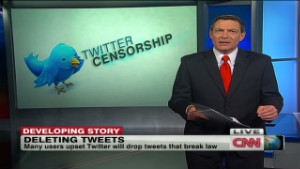 Un portavoce ufficiale di Twitter ha recentemente annunciato che il social network inizierà a cancellare i messaggi degli utenti su base nazionale qualora sia richiesto dalle autorità governative, i messaggi tuttavia saranno ancora visualizzabili nel resto del mondo.
Un portavoce ufficiale di Twitter ha recentemente annunciato che il social network inizierà a cancellare i messaggi degli utenti su base nazionale qualora sia richiesto dalle autorità governative, i messaggi tuttavia saranno ancora visualizzabili nel resto del mondo.
La novità tecnica risiede nel fatto che fino ad oggi la rimozione di un messaggio di Twitter era possibile solo su scala globale, mentre ora la censura è applicabile alle singole reti nazionali.
Nel menzionare alcuni paesi in cui i “tweet” degli utenti potrebbero venire censurati il portavoce di Twitter ha citato, sorprendentemente, due paesi europei, la Germania e la Francia, dove è in vigore il divieto di pubblicare messaggi di incitamento al nazismo. In altri paesi dove la libertà di espressione è fortemente censurata, invece, Twitter non esisterà del tutto,.
Il portavoce del social network ha comunque assicurato che i messaggi verranno eliminati solo dietro segnalazione esterna, caso per caso, ed informando l’utente sul motivo della cancellazione.
The move is significant because, until now, the only way Twitter could comply with countries’ limits was to remove the content globally.
Twitter said it will now delete tweets only “reactively” and on a case-by-case basis and will let the affected user know why the content is being withheld.
“We hold freedom of expression in high esteem and work hard not to remove Tweets,” Twitter spokeswoman Jodi Olson wrote in an e-mail to CNN.
“And just to be clear, this is not a change in philosophy and there are still countries to which we will not go,” she said.
 Twitter to delete posts if countries ask
Twitter to delete posts if countries ask Michelle Obama launches Twitter account
Michelle Obama launches Twitter accountAs examples of countries where tweets may have to be restricted, Twitter mentioned Germany and France, which ban pro-Nazi content. Twitter will operate in those countries while censoring pro-Nazi tweets, for example.
But some countries are so restrictive with freedom of expression that Twitter can’t exist there at all, the company said.
“One of our core values as a company is to defend and respect each user’s voice,” Twitter wrote in a blog entry Thursday. “We try to keep content up wherever and whenever we can, and we will be transparent with users when we can’t. The Tweets must continue to flow.”
But one observer said the move is blatant censorship.
“There’s no way around that. But alas, Twitter is not above the law,” according to Jillian York, the director for international freedom of expression at the Electronic Frontier Foundation, which defends free speech and privacy online.
York said she acknowledges that Twitter, like other companies hosting user-generated content, has at some point faced a government order or request to take down content.
“Twitter has two options in the event of a request: fail to comply, and risk being blocked by the government in question, or comply (read: censor). And if they have ‘boots on the ground,’ so to speak, in the country in question? No choice,” she wrote.
The company is simply “doing its best in a tough situation,” she said.
(CNN) — Online social networking site Twitter said Thursday it will begin deleting users’ tweets in countries that require it — but it will still keep those deleted tweets visible to the rest of the world.
The move is significant because, until now, the only way Twitter could comply with countries’ limits was to remove the content globally.
Twitter said it will now delete tweets only “reactively” and on a case-by-case basis and will let the affected user know why the content is being withheld.
“We hold freedom of expression in high esteem and work hard not to remove Tweets,” Twitter spokeswoman Jodi Olson wrote in an e-mail to CNN.
“And just to be clear, this is not a change in philosophy and there are still countries to which we will not go,” she said.
Twitter to delete posts if countries ask
Michelle Obama launches Twitter account
As examples of countries where tweets may have to be restricted, Twitter mentioned Germany and France, which ban pro-Nazi content. Twitter will operate in those countries while censoring pro-Nazi tweets, for example.
But some countries are so restrictive with freedom of expression that Twitter can’t exist there at all, the company said.
“One of our core values as a company is to defend and respect each user’s voice,” Twitter wrote in a blog entry Thursday. “We try to keep content up wherever and whenever we can, and we will be transparent with users when we can’t. The Tweets must continue to flow.”
But one observer said the move is blatant censorship.
“There’s no way around that. But alas, Twitter is not above the law,” according to Jillian York, the director for international freedom of expression at the Electronic Frontier Foundation, which defends free speech and privacy online.
York said she acknowledges that Twitter, like other companies hosting user-generated content, has at some point faced a government order or request to take down content.
“Twitter has two options in the event of a request: fail to comply, and risk being blocked by the government in question, or comply (read: censor). And if they have ‘boots on the ground,’ so to speak, in the country in question? No choice,” she wrote.
The company is simply “doing its best in a tough situation,” she said.














Aggiungi commento